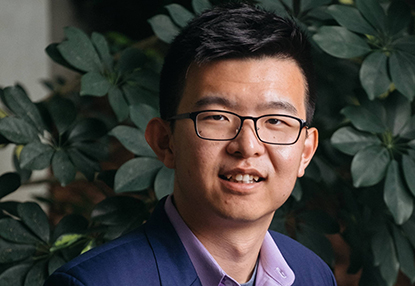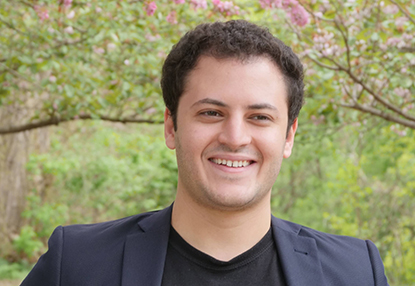Awards: Vanier Canada Graduate Scholarship recipients announced
The Vanier Canada Graduate Scholarship recognizes graduate researchers who have demonstrated exceptional leadership and scholarly achievement within their field of study.
Five PhD students at Western have been named among the 166 recipients across Canada for 2021-2022, including three from the Schulich School of Medicine & Dentistry: Samir Hamadache, Olivia Ghosh-Swaby and Peter Zeng.
As part of the scholarship, recipients receive $50,000 over three years to support their studies.
 Recipient Peter Zeng, a student of the combined MD/PhD program, says he was inspired to pursue research in HPV-related head and neck cancer after the diagnosis of a close friend. One of the fastest growing cancer types in Canada, it has a 20 per cent chance of recurrence and current therapies can be debilitating to patients’ ability to talk and swallow.
Recipient Peter Zeng, a student of the combined MD/PhD program, says he was inspired to pursue research in HPV-related head and neck cancer after the diagnosis of a close friend. One of the fastest growing cancer types in Canada, it has a 20 per cent chance of recurrence and current therapies can be debilitating to patients’ ability to talk and swallow.
Working in Dr. Anthony Nichol’s lab, Zeng is looking to tackle these challenges by studying the characteristics of all three levels of the central dogma: DNA, RNA and protein in tumours before and after treatment. The insights generated from analyzing the tumour prior to treatment will help predict a patient’s response and tailor treatment for each patient. Studying post-treatment recurrent tumours will offer a better understanding of why some patients suffer recurrence and identify drugs for treating them.
“I’m really grateful for the financial support and feel humbled to receive the Vanier scholarship,” he said.
 Olivia Ghosh-Swaby, PhD Candidate in Neuroscience, has been studying the impact of exercise and anti-diabetic drugs on restoring neural stem cells, memory and mood in obesity. Obesity affects brain functions by reducing the amount of stem cells residing in the hippocampus, a region vital for memory and mood regulation. Under the supervision of Lisa Saksida, PhD, Ghosh-Swaby is using animal models exposed to a high-sugar, high-fat diet to determine whether exercise and anti-diabetic drugs could reverse negative effects of obesity and improve cognitive function.
Olivia Ghosh-Swaby, PhD Candidate in Neuroscience, has been studying the impact of exercise and anti-diabetic drugs on restoring neural stem cells, memory and mood in obesity. Obesity affects brain functions by reducing the amount of stem cells residing in the hippocampus, a region vital for memory and mood regulation. Under the supervision of Lisa Saksida, PhD, Ghosh-Swaby is using animal models exposed to a high-sugar, high-fat diet to determine whether exercise and anti-diabetic drugs could reverse negative effects of obesity and improve cognitive function.
She says her passion for neuroscience was sparked when her cousin was diagnosed with a genetic brain disorder.
“I had supported her care in Boston and Ottawa during my undergraduate studies until she passed. Many questions about her condition were still unanswered. So, I wanted to engage in neuroscience research to better understand how we can exploit the existing regeneration systems in the brain via diet, exercise and anti-diabetic drugs to improve learning and memory.”
Being named a Vanier Scholar has been affirming for Ghosh-Swaby, who has been an advocate and leader in supporting equitable academic and athletic spaces.
“I hope this honour shows the young Black and Brown girls out there that they too have the potential to be successful in academia, even when the system may be against you and you’re starting from the ground up.”
 Samir Hamadache, PhD Candidate in Biochemistry, is using bacteria to develop synthetic plant organelles that would result in self-fertilizing plants.
Samir Hamadache, PhD Candidate in Biochemistry, is using bacteria to develop synthetic plant organelles that would result in self-fertilizing plants.
“While chemical fertilizer has been critical in accelerating agricultural production to feed billions of people, runoff from fields causes algae blooms that are very damaging to freshwater ecosystems. We are creating plants that can fertilize themselves using nitrogen from the atmosphere.”
Some plant organelles have evolved from free-living bacteria in a process known as endosymbiosis. Today, this evolutionary process can be recreated in the lab.
Hamadache is looking to automate this process by building a device using microscopic traps to bring individual yeast and bacterial cells into contact and merge them. This device would facilitate the creation of new organelles with ease, allowing synthetic biologists to focus their efforts on how they can be better used and applied.
Read more about Western’s Vanier Scholarship recipients in Western News.









